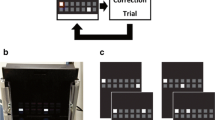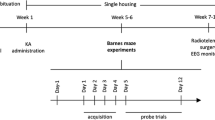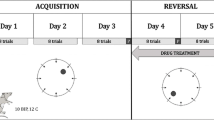Summary
Rats were trained to alternate responses on a discrete trial working memory task on a T-maze. In Experiment 1, the rats were then matched for choice accuracy and allocated to three treatment groups. These were: implantation of osmotic minipumps for intraventricular infusion of either (a) 15 mM D-2-amino-5-phosphonopentanoic acid (AP5) or (b) artificial cerebrospinal fluid (VEH); and an unoperated control group (UNOP). In Phase 1 we assessed alternation performance with a minimal delay between responses: the UNOP and VEH rats continued to choose accurately; the AP5 rats showed an impairment of choice accuracy, but recovered over days. In Phase 2 a 20-s delay between responses was enforced, and choice accuracy was assessed following injections either of saline or of Milacemide HC1 (10 mg/kg). There was now a severe and enduring impairment of choice accuracy in the AP5 group, but Milacemide injections did not affect performance in any of the treatment groups. In Experiment 2 rats were trained in a similar way, and then given intraperitoneal injections of MK801 or of physiological saline in a within-subjects design and tested for T-maze performance with a minimal or a 20-s delay between responses. In the first Phase, MK801 was given 10-min before behavioural testing commenced; in the second Phase, it was given 28–40 min before behavioural testing commenced. The outcome depended critically on the time between drug injection and testing. There was a significant drug-induced impairment of choice accuracy in both Phases; but in Phase 1 there was no impairment in testing with a minimal retention interval and an impairment with a 20-s retention interval. In Phase 2, the impairment was significant at both retention intervals. We conclude that AP5, but not MK801, interferes with temporary memory storage in a delay-dependent manner.
Similar content being viewed by others
References
Abraham WC, Mason SE (1988) Effects of the NMDA receptor/channel antagonists CPP and MK801 on hippocampal field potentials and long-term potentiation in anesthetized rats. Brain Res 462:40–46
Aggleton JP, Hunt PR, Rawlins JNP (1986) The effects of hippocampal lesions upon spatial and nonspatial tests of working memory. Behav Brain Res 19:133–146
Boitano JJ, Dokla CJP, Mulinski P, Misikonis S, Kaluzynski T (1980) Effects of hippocampectomy in an incremental-step DRL paradigm. Physiol Behav 25:273–278
Clark CVH, Isaacson RL (1965) Effect of hippocampal ablation on DRL performance. J Comp Physiol Psychol 59:137–140
Clineschmidt BV, Williams M, Witoslawski JJ, Bunting PA, Risley EA, Torato JA (1982) Restoration of shock-suppressed behavior by treatment with (+)-5-methyl-10,11-dihydro-5H-dibenzo[a,d]cyclohepten-5,10-imine (MK801), a substance with potent anticonvulsant, central sympathomimetic, and apparent anxiolytic properties. Drug Dev Res 2:147
Collingridge GL, Kehl SJ, Mclennan J (1983) Excitatory aminoacids in synaptic transmission in the Shaffer collateral-commissural pathway of the rat hippocampus. J Physiol (Lond) 334:33–46
Collingridge GL, Kehl SJ, Mclennan J (1984) The action of some analogues of the excitatory amino acids in the dentate gyrus of the rat. Can J Physiol Pharmacol 62:424–429
Collingridge GL, Bliss TVP (1987) NMDA receptors — their role in long-term potentiation. TINS 10:288–293
Cotman CW, Iversen LL (1987) Excitatory amino acids in the brain — focus on NMDA receptors. TINS 10:263–265
Errington ML, Lynch MA, Bliss TVP (1987) Long-term potentiation in the dentate gyrus: induction and increased glutamate release are blocked by D(-) aminophosphonovalerate. Neuroscience 20:279–284
Gray JA, Rawlins JNP (1986) Comparator and buffer memory: an attempt to integrate two models of hippocampal function. In: Isaacson RL, Pribram KH (eds) The hippocampus, Vol 4. Plenum Press, New York, pp 159–201
Halliwell RF, Morris RGM (1987) Anticonvulsant doses of MK-801 fail to block long-term potentiation in vivo or impair spatial memory in the rat. Neurosci Lett Suppl 29:S99
Harris EW, Ganong AH, Cotman CW (1984) Long-term potentiation in the hippocampus involves activation of N-methyl-D-aspartate receptors. Brain Res 323:132–137
Johnson JW, Ascher P (1987) Glycine potentiates the NMDA response in cultured mouse brain neurons. Nature 325:529–531
Lieberman DA, McIntosh DC, Thomas GV (1979) Learning when reward is delayed: a marking hypothesis. J Exp Psychol (Anim Behav Proc) 5:224–242
McNaughton BL, Morris RGM (1987) Hippocampal synaptic enhancement and information storage within a distributed memory system. TINS 10:408–415
Mondadori G, Weiskrantz L, Buerki F, Petschke F, Fagg GE (1989) NMDA receptor antagonists can enhance or impair learning performance in animals. Exp Brain Res 75:449–456
Morris RGM (1989) Synaptic plasticity and learning: selective impairment of learning in rats and blockade of long-term potentiation in vivo by the N-methyl-D-aspartate receptor antagonist AP5. J Neurosci 9:3040–3057
Morris RGM, Garrud P, Rawlins JNP, O'Keefe J (1982) Place navigation impaired in rats with hippocampal lesions. Nature 297:681–683
Morris RGM, Anderson E, Lynch GS, Baudry M (1986) Selective impairment of learning and blockade of long-term potentiation by an N-methyl-D-aspartate receptor antagonist, AP5. Nature 319:774–776
Rawlins JNP (1985) Associations across time: the hippocampus as a temporary memory store. Behav Brain Sci 8:479–496
Rawlins JNP (1986) Modes of action of post-trial manipulations of learning: memories lost and memories regained. Acta Neurologica Scand 74:61–68
Rawlins JNP, Olton DS (1982) The septo-hippocampal system and cognitive mapping. Behav Brain Res 5:331–358
Rawlins JNP, Tsaltas E (1983) The hippocampus, time and working memory. Behav Brain Res 10:233–262
Robinson GS Jr, Crooks GB Jr, Shinkman PG, Gallagher M (1989) Behavioral effects of MK-801 mimic deficits associated with hippocampal damage. Psychobiology 17:156–164
Tonkiss J, Feldon J, Rawlins JNP (1990) Section of the descending columns of the fornix produces delay- and interference-dependent working memory deficits. Behav Brain Res 36:113–126
Tonkiss J, Morris RGM, Rawlins JNP (1988) Intra-ventricular infusion of the NMDA antagonist AP5 impairs performance on a non-spatial DRL task in the rat. Exp Brain Res 73:181–188
Wagner AR, Rudy JW, Whitlow JW (1973) Rehearsal in animal conditioning. J Exp Psychol Monograph 97:407–426
Willetts J, Balster RL (1988) Phencyclidine-like discriminative properties of MK-801 in rats. Eur J Pharmacol 146:167–169
Author information
Authors and Affiliations
Rights and permissions
About this article
Cite this article
Tonkiss, J., Rawlins, J.N.P. The competitive NMDA antagonist AP5, but not the non-competitive antagonist MK801, induces a delay-related impairment in spatial working memory in rats. Exp Brain Res 85, 349–358 (1991). https://doi.org/10.1007/BF00229412
Received:
Accepted:
Issue Date:
DOI: https://doi.org/10.1007/BF00229412




